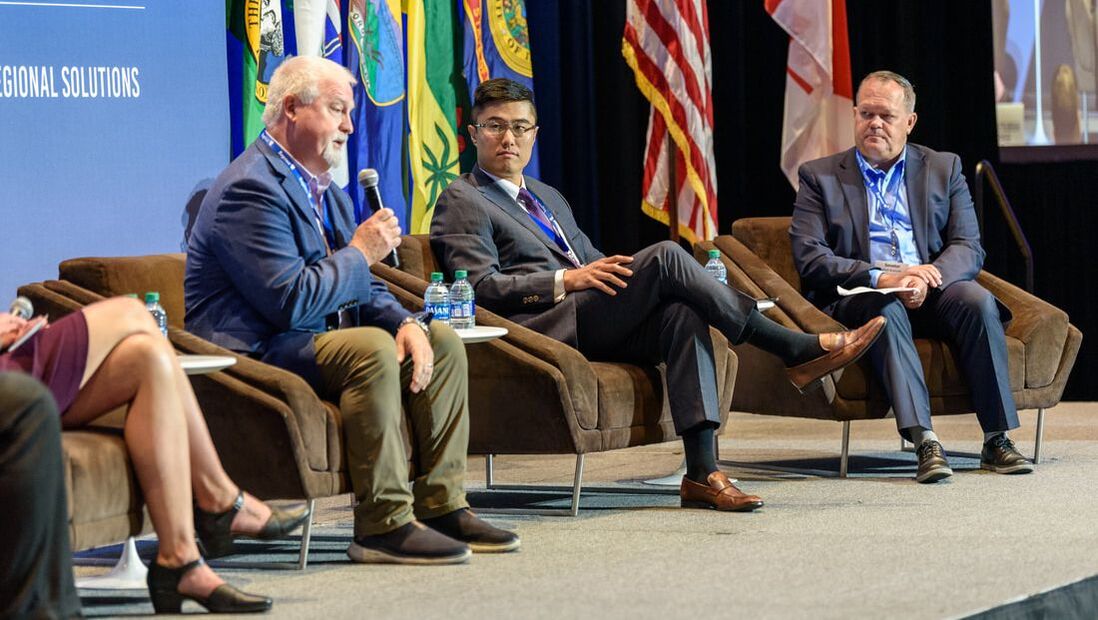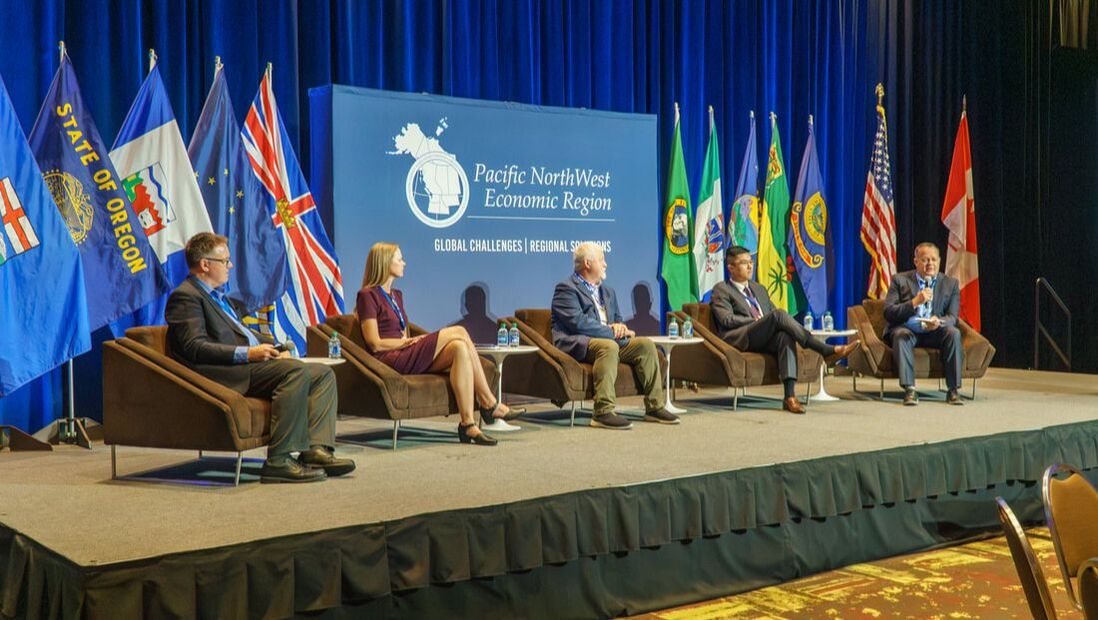|
By Kai Guo, CFA, Vice President, Hydrogen Infrastructure Development - West Region at Mitsubishi Power This article is a submission from PNWER Sponsor, Mitsubishi Power Americas, and does not necessarily reflect the views of PNWER. Learn more about Mitsubishi Power Americas at power.mhi.com/regions/amer/products/hydrogen. A newly streamlined process for claiming tax credits under the Inflation Reduction Act (IRA) represents the next important stage of realizing the law’s impact. The process could bring affordable clean hydrogen production and storage projects to exciting new frontiers. With new players come new possibilities for hydrogen as a foundational element to the portfolio mindset we’ll need to reach zero-emissions energy. This shift also reinforces the need for cross-sector thinking – to enable stakeholders in adjacent industries to build off each other’s innovations and optimize demand, adopt used fuels for second-life applications, seek permitting reform, and more. When I spoke last week at the annual Pacific NorthWest Economic Region (PNWER) summit in Boise, Idaho, it was clear that collaboration remains essential to solving the climate crisis. Beyond unlocking innovation, it represents a promising opportunity to make these innovations more affordable. And that’s a critical step to moving the world off its current portfolio of transportation, industrial, and energy fuels, where fossil fuels still drove an estimated 81% of global energy consumption in 2022. If that percentage is disheartening, realize that we’re also making progress. Recently, a new projection of U.S. greenhouse-gas emissions by the Rhodium Group found a “meaningful departure” from previous forecasts, thanks to the IRA, to put U.S. targets for 2030 under the Paris Agreement within reach. I find that galvanizing – and I know that if we can break down our silos, we stand at the precipice of tremendous opportunity. Humanity has never lacked innovation. At PNWER, I saw it on display. Panelists discussed demand-side management projects that incentivize EV drivers to charge during off-peak hours. They made the case for faster permitting. They detailed new usages for spent nuclear fuel, off-gassed methane, and post-pyrolysis carbon. Indeed, a portfolio approach to energy production, consumption, and infrastructure requires more cross-sectoral analysis. As fellow panelist Shannon Bragg-Sitton put it, we need a “better understanding [of] how we can use energy from one sector to benefit another.” I couldn’t agree more. From left: Dave Bennett, Director, Renewable Gas and Low Carbon Fuels, FortisBC; Shannon Bragg-Sitton, Division Director, Integrated Energy & Storage Systems, Idaho National Laboratory; Jeff Morris, Senior Director, State Government Relations, Schneider Electric North America; Kai Guo, Vice President, Hydrogen Infrastructure Development, Mitsubishi Power Americas; and Senator Matt Boehnke, Washington State Senate. Public Investment Helps the First Movers The clean-hydrogen economy is still in the early innings, and public funding can help the first movers. Starting in 2021, the Department of Energy launched a series of large-scale energy investments it calls “earthshots,” a riff on moonshots. It’s a good way to disburse the $9.5 billion in clean-hydrogen initiatives from the bipartisan Infrastructure Investment and Jobs Act (IIJA). A year later, the IIJA helped fund Regional Clean Hydrogen Hubs program (H2Hubs), which allocates up to $7 billion for 6 to 10 clean hydrogen hubs across America. The program is progressing, with awards expected to come by year’s end and funding to commence in early 2024. Commitments like these demonstrate how investment from the public sector has helped first movers in hydrogen scale-up technologies at a rate that may not have happened with private capital alone. Even before the IIJA, public investment has borne fruit. Mitsubishi Power and Magnum Development jointly developed the Advanced Clean Energy Storage hub. Currently under construction in Utah, the project is one of the largest renewable-energy storage hubs in North America to reach financial close. And it’s in big part thanks to a $504.4 million DOE loan guarantee secured in 2022. The ACES Delta hub is one of the largest sites yet for hydrogen production and storage, in this case for the IPP Renewed project from Utah’s Intermountain Power Agency. The ACES Delta hub will use electrolysis powered by renewable energy to generate hydrogen, storing it in underground salt caverns and eventually using it to fuel electricity-generating turbines at the IPP Renewed power plant. That’s an example of the collaboration we need – with permitting and cross-sector innovation – to bring clean hydrogen closer to end users, eventually including hard-to-abate industrial and transportation sectors. Mitsubishi Power is bringing that innovation to remote parts of the continent, like British Columbia’s Kerry Lake East Indian Reserve. Working with the local tribe to provide jobs and sustainable revenue, Mitsubishi Power will use the proposed $5 billion hub to produce hydrogen and ammonia, another zero-emissions energy source. “We need to develop solutions together, to facilitate learnings. We can’t build these in silos.” We welcome the IRA’s streamlined credits to bring more players into clean hydrogen and related infrastructure. We need a combination of smaller-scale projects that sit closer to end users, large utility-grade projects, and infrastructure to transport the energy. Both will address the intermittencies associated with renewable power by spreading them across longer timeframes – to enable what my colleague Dr. Hari Gopalakrishnan, Market Intelligence and Strategy Manager at Mitsubishi Power, called “seasonal energy arbitrage” at last spring’s BloombergNEF Summit. Lowering Cost Is About Cooperation, Not Just Scale The portfolio approach to innovation can help lower prices, as can public capital and regulatory streamlining. I don’t know if enough stakeholders understand the critical need to lower costs as we build out technologies to enable more renewable supply. At PNWER, Emissions Reduction Alberta CEO Justin Riemer – whose province is phasing out coal emissions this year – put it well. “We’re taking a portfolio approach to generation and supply, what we need to get to net zero,” Riemer said. “Everything we’re talking about is expensive. Carbon capture, hydrogen, storage, the energy transition – it’s a lot more cost than we’ve seen in energy. We need to cooperate to reduce that. … We need to develop solutions together, to facilitate learnings. We can’t build these in silos.” The energy transition requires stakeholders to work across sectors to apply and scale solutions at a rapid pace. A portfolio approach requires breaking down silos to collaborate across supply, infrastructure, demand, and byproducts. Success means the cost of renewable, reliable energy will decrease, lifting viability and usage to levels that can put the world on an auspicious path to net zero.
0 Comments
|
Archives
August 2023
Topics
All
|
|
World Trade Center West
2200 Alaskan Way, Suite 460 Seattle, WA 98121 |
|


